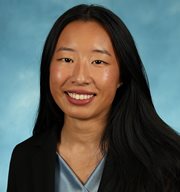Victoria Lam

Before attending medical school, Victoria was a cadet at the United States Military Academy and commissioned as an active duty officer in the United States Army. In her undergraduate studies, she studied Life Science with a minor in Cyber Security. She is now in the Army reserves and is currently a second-year medical student at the University of North Carolina School of Medicine in Chapel Hill, NC. Her past research includes survey design in the area of trauma-informed care, data collection in dermatology, and synthesis of agents for biodetection.
Victoria's future pursuits in Army medicine will include deployments and participation in the Army's Humanitarian Relief initiatives around the world. Her research, shadowing experiences and the mentorship she has received have solidified her unwavering commitment to pursuing a challenging and fulfilling career where she will merge her passion for medicine with her dedication to service.
In her freetime, she enjoys crocheting, exercising and doing jigsaw puzzles.

Addressing human mobility as the main barrier to malaria elimination in Zanzibar
Zanzibar
Tanzania
What does the Kean Fellowship mean to you?
The Kean Fellowship is an invaluable experience and privilege that will undoubtedly foster professional and personal growth. I am excited to make the most out of the opportunity to engage and work with neglected infectious diseases and tropical medicine and familiarize myself with a new culture. I foresee that my commitment to being culturally fluent is how I will make myself as a medical educator, officer and leader in the U.S. Army Medical Corps, and a physician more accessible for all populations.
What do you anticipate learning?
I anticipate being exposed to a new culture as well as understanding the process of designing, implementing, and refining a project while working with international institutions. I will be involved in the design and creation of a survey to administer to travelers to assess that future interventions could be feasible and acceptable. Once in Zanzibar, I will direct and work with a small field team to survey travelers living in shehias where positive cases of malaria have been reported and reactive case detection is being carried out. This will offer me the opportunity to interact with families and understand travel patterns and behaviors, as well as lived experiences of people in Zanzibar. Being present will allow me to observe the survey actively, refine, and see the full extent of the project.
What interests you about tropical medicine and what problems are you interested in solving?
As a future physician and medical officer in the United States Army, I desire to balance my time practicing medicine with research and influence on advancing military medicine. If I am more familiar with how medicine and public health are delivered in resource-poor countries and how research can lead to better health outcomes, then I will be a better advocate for improving policies, education, and use within military medicine.